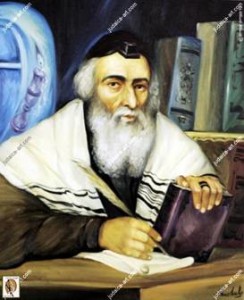R. YAAKOV ANATOLI ON B’NAI NOACH
When the descendants of Noah were commanded concerning dinim, the commandment was only that they establish laws among themselves, for the world rests on law. Thus also, even after the Sinai revelation: the judges were directed to establish legal norms suited to their nations concerning what had not been commanded. And so it is practiced today among the nations. Merchants and artisans were also instructed to establish regulations among themselves. Donkey drivers are permitted to agree among themselves that when one loses a donkey, the others will replace it, and seamen are permitted to agree among themselves that if one loses a ship, the others will replace it. Similarly, they may agree that if a slaughterer works on a day not designated as his, the skin of his beast shall be destroyed. [or as established in the Talmud,] basket weavers and wool merchants who journey to another town may be prevented by that city’s merchants from selling their wares. In all such cases, since the Torah has enjoined obedience to the judges of every generation, it is as though the law was written in the Torah, and anyone who violates it violates the Torah itself.
All this relates to the principle ” the law of the land is binding.” Since the commandment of dinim is ancient, and since it is impossible to provide for every new situation, it follows that the decree of the king should be valid and that we should issue rulings in accordance with it, providing it does not contradict the Torah.
for PDF of Original Hebrew text click here:
MALMAD HATALMIDIM
R. Ya’akov b. R. Abba Mari Anatoli, flourished in Provenzia (southern France) c. 1200, but spent his last years in Italy. His mentor was his father-in-law, the famous translator and philosopher Shmuel ibn Tibbon. R. Ya’akov Anatoli also translated compilations dealing with torah and science from Arabic to Hebrew. He used to publicly preach on matters of faith, ethics and service of God, and he later collected these sermons according to the biblical order in his book, Malmad haTalmidim. In this work he quoted the Sages and many philosophers, including Christians. This book was considered quite important in its time, and was quoted in later books of philosophy and Jewish Law, including Sefer Orchot Hayim, Kolbo, Sefer Menorat haMaor, and Sefer Abudraham. R. Ya’akov fought against the opponents of philosophy, and consequently he and his book were attacked by Rashba and other rabbis. At the end of his life he relocated to Naples, and was closely associated with Friedrich II, the Holy Roman Emperor. The Malmad haTalmidim was published once by the Mekitzei Nirdamim Society in 1866 from a manuscript in Lyck, Prussia, and since then has been reproduced.
Click here for: The Laws Incumbent Upon the Nations
LAW IS THE CONCERN OF ALL HUMANITY
Law is the concern of all humanity…”Pray for the welfare of the state” (Avot 3:2), for it is the state that establishes law in the land: “The king by justice establishes the land” (Proverbs 29:2). And all of this is equally true of non-Jewish governments, for the descendants of Noah were also commanded concerning dinim. (Rav Avraham Koo, introduction to tractate Sanhedrin (1934) (see R. Moshe Tzvi Neriah, Tehumim, VII (1986), 275. )
The Noahide commandment of dinim establishes a point of commonality between the Jewish people and other nations on the most fundamental level of social existence.
…statutes based upon reason are incumbent upon the descendants of Noah. …The most important aspect of the commandment of dinim is… the very obligation of establishing the rule of law, of justice, of rationality, and of natural equity.
(Nahum Rakover: Law and the Noahides, The Library of Jewish Law, 1998, p. 112.)
THE LAWS INCUMBENT UPON THE NATIONS
The meaning of their (B’Nai Noach) obligation of dinim is that they are required to established laws of honesty and right behavior; they are not bound by the laws of the Bible except those that were commanded explicitly (e.g. prohibition of murder, etc.). That which Israel was commanded, to judge between one man and another, was not addressed to the descendants of Noah. (Hazon Ish, Baba Kama 10:3)
And it is clear that their (B’nai Noach) dinim are not meant to be the laws of the Torah, but rather convention. And although there are those who have investigated this extensively, the truth is as I have written, and there is no need to go any further length on this matter.” ( R. Yehi’el Mikhel Epstein, Arukh haShulhan he’Atid, Hilkhot Melakhim 79:15. )
This seems to support those authorities who have argued against Rema’s holding that, in practice, we rule according to R. Yitzhak who infers dinim from Elohim, and that consequently descendants of Noah must judge according to the laws of the Torah…On the contrary, it is accepted that according to all opinions in the Talmud, descendants of Noah need give judgment in accordance with convention only, not biblical law.
(R. Meir Dan Plotzki, Hemdat Yisrael, Kuntres Ner Mitzvah, p. 99b.)
Click here for link to Rema, Tshuva #10, Hebrew
Perhaps dinim is different, for there is a great difference between their laws, which are based upon human understanding, and the laws of Israel, which were given by God at Sinai. Thus it is proper to declare in the benediction, “Who commanded us,” since He has not dealt so with any other nation; and as for His ordinances, they have not known them. (R. Tzvi Pesah Frank, Har Tzvi, Orah Hayyim II, Kuntres Mili de Berakhot, he’arah to 2:1. )
And even as regards the commandments they did receive, I have already written that the details of these commandments were not communicated to them. And this is certainly the case with regard to the commandment of dinim in which they were commanded simply to establish courts as in Sanhedrin 56b, and as explained by Maimonides Hilkhot Melakhim 9:14). And although Nahmanides differed with Maimonides, holding that with regard to the specifics of their laws they are bound to judge after the fashion of the laws of Israel, it seems clear that his intention is to say that just as in the case of Israel, for whom the basis of the commandment of dinim is the obligation of every individual to obey the laws, so also for descendants of Noah, the obligation is for each individual to act in accordance with the law. For Maimonides, on the other hand, the commandment of dinim is only that of establishing courts. Thus, a Noahide may not be executed for failing to obey the law, since it is not one of the seven commandments. Hence, even according to Nahmanides, the particulars of Noahide law may certainly differ from those of Jewish law. The operative principle of Jewish law is the holiness of the Torah, while Noahide law is based up the dictates of basic human honesty. (R. Avraham Kook, Etz Hadar, chap. 40, text to n.11.)
THE WORLD IS SUSTAINED BY THREE THINGS
שמעון הצדיק היה משירי כנסת הגדולה הוא היה אומר על שלשה דברים העולם עומד על התורה ועל העבודה ועל גמילות חסדים
Mishneh 18: Rabban Shimeon Ben Gamliel would say: The world is sustained by three factors, by Justice, by Truth, and and Peace.Rabbi Shimeon Ben Gamliel said that the world is preserved by three factors, by Law, Truth, and Peace.
Visit Jewish.TV for more Jewish videos.
Visit Jewish.TV for more Jewish videos.
U.S. Congress on Noahide Laws
H.J.Res.104
Joint Resolution
To designate March 26, 1991, as `Education Day, U.S.A.’.
Whereas Congress recognizes the historical tradition of ethical values and principles which are the basis of civilized society and upon which our great Nation was founded;
Whereas these ethical values and principles have been the bedrock of society from the dawn of civilization, when they were known as the Seven Noahide Laws;
Whereas without these ethical values and principles the edifice of civilization stands in serious peril of returning to chaos;
Whereas society is profoundly concerned with the recent weakening of these principles that has resulted in crises that beleaguer and threaten the fabric of civilized society;
Whereas the justified preoccupation with these crises must not let the citizens of this Nation lose sight of their responsibility to transmit these historical ethical values from our distinguished past to the generations of the future;
Whereas the Lubavitch movement has fostered and promoted these ethical values and principles throughout the world;
Whereas Rabbi Menachem Mendel Schneerson, leader of the Lubavitch movement, is universally respected and revered and his eighty-ninth birthday falls on March 26, 1991;
Whereas in tribute to this great spiritual leader, `the rebbe’, this, his ninetieth year will be seen as one of `education and giving’, the year in which we turn to education and charity to return the world to the moral and ethical values contained in the Seven Noahide Laws; and
Whereas this will be reflected in an international scroll of honor signed by the President of the United States and other heads of state: Now, therefore, be it
Resolved by the Senate and House of Representatives of the United States of America in Congress assembled,
- That March 26, 1991, the start of the ninetieth year of Rabbi Menachem Schneerson, leader of the worldwide Lubavitch movement, is designated as `Education Day, U.S.A.’. The President is requested to issue a proclamation calling upon the people of the United States to observe such day with appropriate ceremonies and activities.
Speaker of the House of Representatives.
Vice President of the United States and
President of the Senate.





Lubavitcher Rebbe on B’nai Noach
Seminal Talk by the Lubavitcher Rebbe on the education of B’nai Noach: